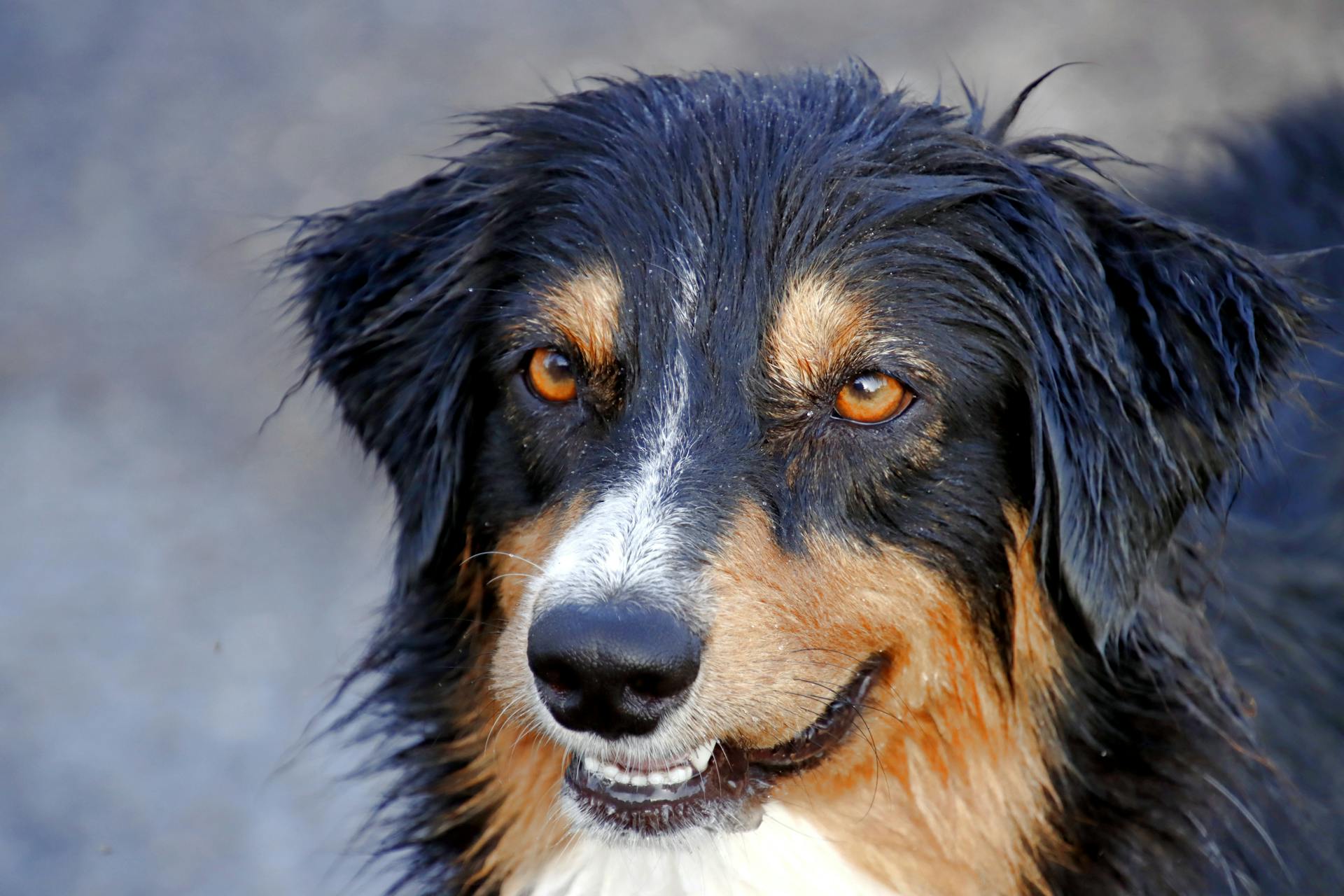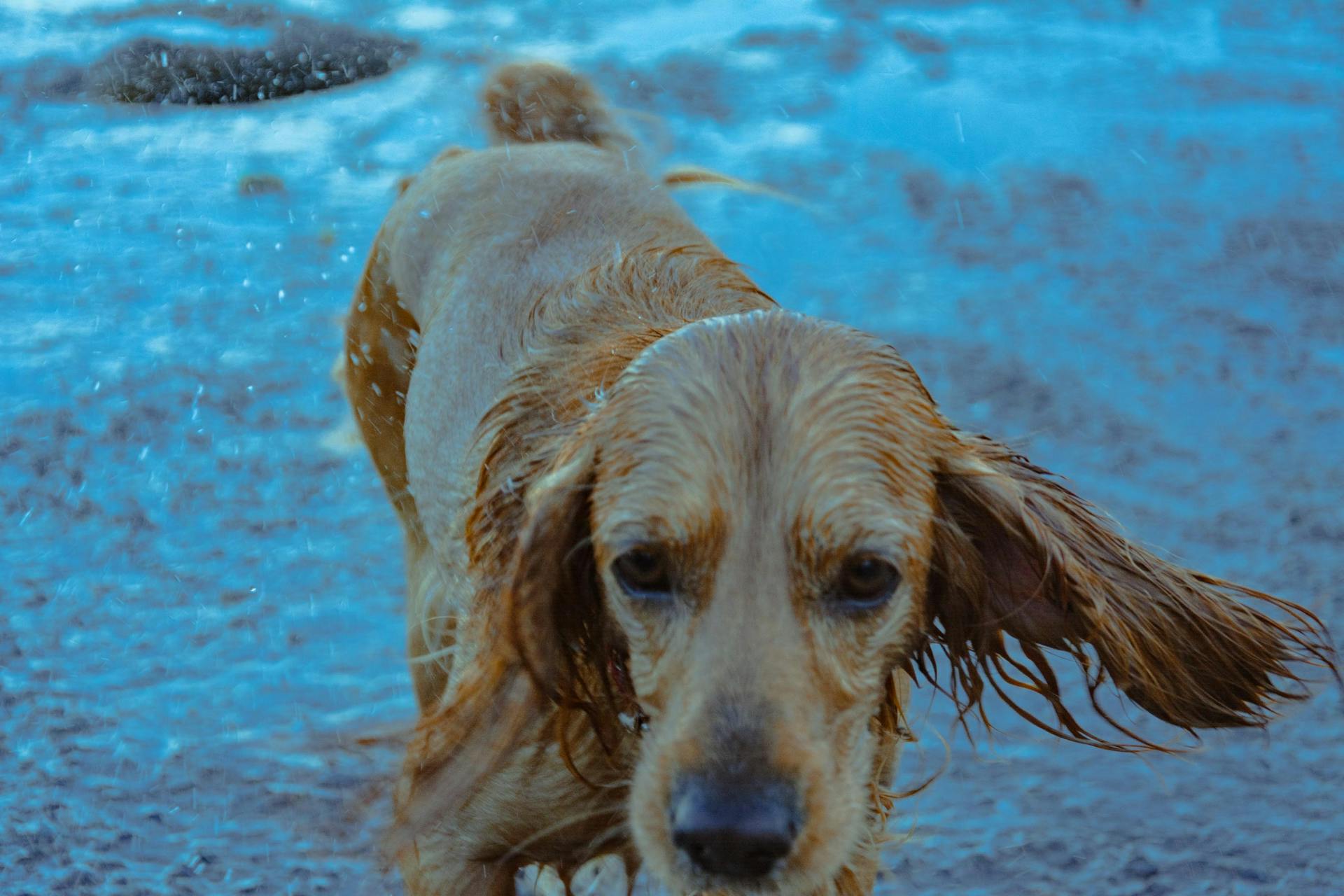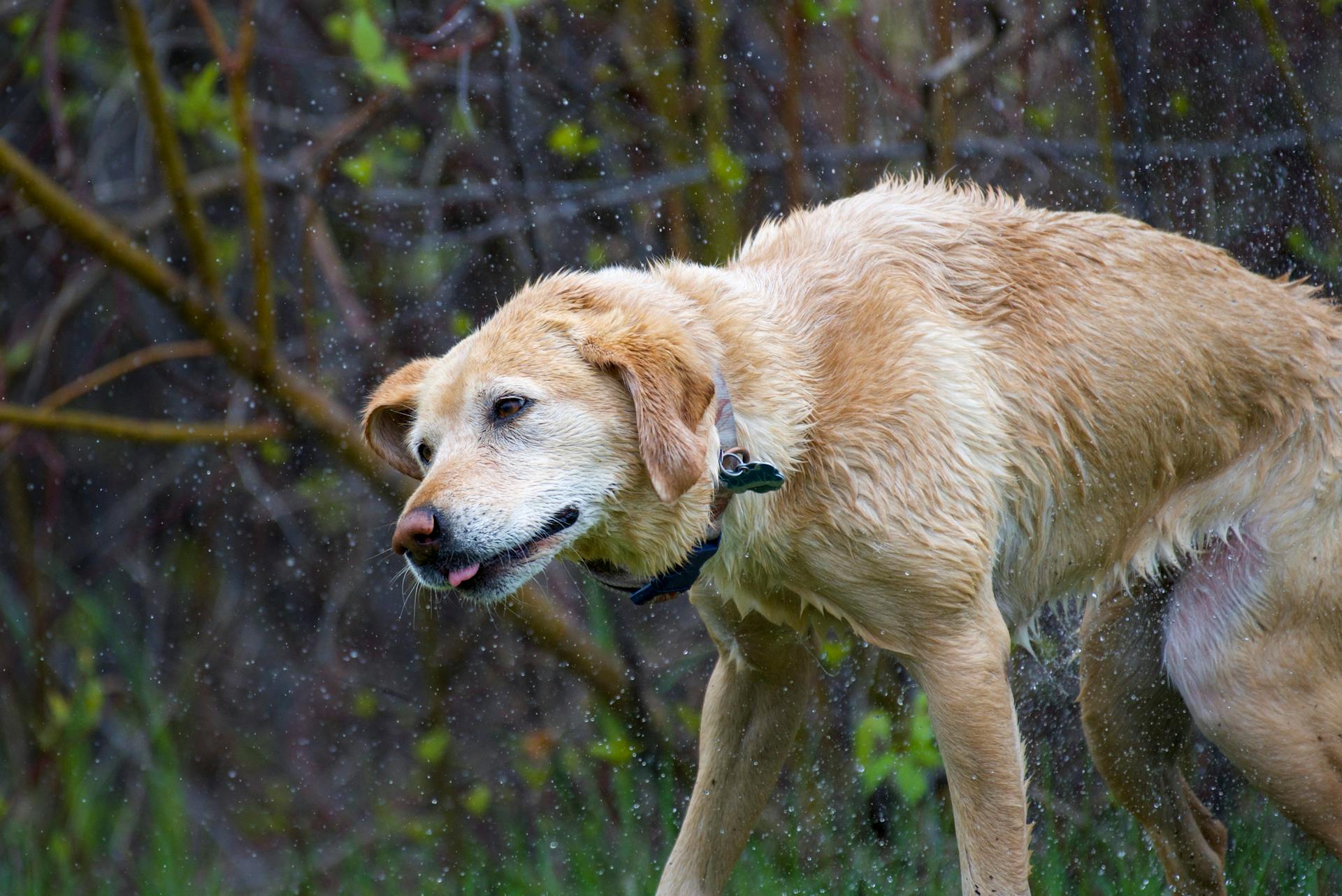
Wet dog odor is a common issue many pet owners face. It's caused by the combination of sweat, dirt, and bacteria that thrive on a dog's skin and coat.
The main culprit behind wet dog odor is apocrine glands, which are responsible for producing a protein-rich secretion that's a magnet for bacteria. This secretion is particularly prevalent in areas like the paws, groin, and armpits.
To eliminate wet dog odor, you need to address the root cause: bacteria growth. Regular bathing and grooming can help reduce the amount of bacteria on your dog's skin and coat.
By understanding the science behind wet dog odor, you can take effective steps to eliminate it and keep your furry friend smelling fresh and clean.
Suggestion: Dog Skin Odor
Causes and Production
Wet dog odor is a real thing, and it's not just your imagination. The smell of wet dog is caused by tiny critters like yeasts and bacteria that live on your pet's skin. These microorganisms leave behind volatile organic compounds (VOCs) as they go about their lives, and when moisture evaporates, it carries some of these compounds with it.
The signature odor of wet dog is a mixture of scents, including almond, fruit, honey, and mushroom, with hints of sulfur and feces. It's not the dogs themselves that are stinky, but rather the microorganisms they carry.
Moisture is the key factor in creating wet dog odor. Your dog's wrinkles, oils, and weird skin stuff all contribute to the smell. Even drool and slobber, which may seem like a minor issue, can make a big difference in the overall stench.
Here are some common sources of moisture that can contribute to wet dog odor:
- Wrinkles, oils, and weird skin stuff
- Drool and slobber
- Time spent outside, especially in wet environments
- How often your dog is bathed (or not bathed)
- Allergies, dermatitis, or yeast infections
These factors can all contribute to the buildup of VOCs on your dog's skin, which is then released as wet dog odor.
Removal and Elimination
Bathing your dog regularly can make a big difference in reducing wet dog smell. Bathing them once or twice a month is usually enough.
You can also use natural enzyme cleaners to get rid of tough pet odors, especially urine. These cleaners are safe to use around pets and come in various forms.
To remove wet dog smell from your car, clean the interior thoroughly by vacuuming and washing mats. You can use a 50/50 solution of white vinegar and water as a spray to eliminate odors. Let the mixture air dry or wipe it off with a cloth.
Here are some quick removal and elimination tips:
- Frequent routine drying is key to reducing wet dog smell.
- Natural enzyme cleaners are effective at eliminating tough pet odors.
- Use baking soda to neutralize smells on upholstery, carpets, and couches.
- Vacuum and deodorize carpets and furniture before using a carpet cleaning machine.
Eliminating Odors
Bathing your dog regularly can go a long way in keeping dog smells away. Routine baths, especially once to twice a month, are plenty.
Consider investing in a dog blow dryer or a heavy-duty dog towel to dry your dog more quickly, especially after a bath. You can also take your dog to a professional groomer if needed.
Keep your dog's belongings clean, too. Wash their collars, harnesses, and other items regularly to prevent the buildup of smells. Leather collars may need a special leather cleaner, while nylon collars can be washed in the laundry.
A different take: Can Prong Collars Cause Tracheal Collapse
If your dog tends to roll on the floor or rub against the couch after getting wet, it's best to dry them before they get a chance to move around the house. Consider investing in couch covers or higher-quality bedding if your dog sleeps in your bed.
Here are some effective ways to eliminate odors in your home:
- Use natural enzyme cleaners to get rid of tough pet odors.
- Freshen up with Febreze, but make sure to spray it on surfaces, not directly on the dog.
- Use baking soda to neutralize smells on upholstery, carpets, and other surfaces. Simply sprinkle it liberally, let it sit overnight, and then vacuum it up in the morning.
Remember, a dry environment is key to preventing bacteria and yeast from thriving, which can contribute to that pesky wet dog smell.
Removing an Item from My Car
Removing an item from your car is a great way to declutter and keep your vehicle organized. You can start by taking out everything you can, including trash, loose items, and personal belongings.
To thoroughly clean your car, vacuum everything, including the upholstery, in different directions to get into crevices. Use a handheld vac, a shop-vac, or a gas station auto vac, but be prepared to use a lot of quarters if you go with the latter.
If this caught your attention, see: How to Get Dog Odor Out of Car
A 50/50 solution of white vinegar and water is a great natural cleaner for your car's upholstery. Spray it on and let it air dry, or wipe it clean if you have leather seats.
To keep your car smelling fresh, consider using a sturdy car seat cover that's easy to remove and launder. This will help keep stinky molecules away from your upholstery.
Prevention and Maintenance
Dry your dog thoroughly after it gets wet to prevent the growth of microbes and the release of odor-causing compounds. This can be done using a towel, a hair dryer, or both.
Using a shampoo designed for dogs with antibacterial or antifungal properties can help reduce the population of microbes on your dog's skin and fur. These shampoos can also remove any dirt or debris that may contribute to the odor by feeding or housing the bacteria.
Regular brushing of your dog's fur can help distribute the natural oils on their skin and fur, acting as a barrier against microbes and odors. This can also remove any loose hair or dead skin cells that may harbor microbes.
Take a look at this: How to Remove Dog Urine Odor from Couch
Here's a quick rundown of some other essential maintenance tasks to keep your dog smelling fresh:
Removing Stuck Items from Furniture
Laundering furniture protectors and slipcovers can help remove stuck items from furniture, as these items can easily get dirty and harbor odors.
Vacuuming whatever can't go in the wash, such as carpet and couch cushions, is crucial to remove stray hairs and other stuck items.
To get under and behind furniture, use a vacuum to suck up items that are hiding in the cracks of the cushions.
Renting a carpet cleaning machine with furniture-cleaning attachments can be a good option for removing stuck items, but it's best to vacuum and deodorize the carpet and furniture first.
Broaden your view: Dog Pee Odor Carpet
Prevention
Prevention is key when it comes to managing wet dog smell. To prevent wet dog smell, dry your dog thoroughly after it gets wet, using a towel, a hair dryer, or both.
Drying your dog quickly is crucial, as bacteria and yeast thrive in moist environments. This is why it's essential to keep your dog's coat dry, especially after a bath or a swim. Regular brushing can also help distribute natural oils on your dog's skin and fur, acting as a barrier against microbes and odors.
Explore further: Mixing Dry and Wet Food for Dogs

Use a shampoo designed for dogs and has antibacterial or antifungal properties to reduce the population of microbes on your dog's skin and fur. Rinse your dog well after shampooing to remove any soap residue that may irritate their skin or trap moisture in the coat.
Cleaning your dog's ears, mouth, and skin folds regularly can also help prevent wet dog smell. Use a gentle cleanser or wipes to remove any dirt, wax, saliva, or food particles that may accumulate in these areas.
Here are some key prevention tips to keep in mind:
- Dry your dog thoroughly after it gets wet.
- Use a shampoo designed for dogs and has antibacterial or antifungal properties.
- Rinse your dog well after shampooing.
- Clean your dog's ears, mouth, and skin folds regularly.
- Brush your dog regularly to distribute natural oils and prevent matting.
By following these simple tips, you can help prevent wet dog smell and keep your furry friend fresh and clean.
Body Odor
Bathing your dog regularly can help prevent wet dog smell. Bathing your dog once to twice a month is usually enough.
Drying your dog thoroughly after a bath is just as important as the bath itself. Consider investing in a dog blow dryer or a heavy-duty dog towel to speed up the drying process.
You might enjoy: My Dog Has an Odor Even after a Bath

Regularly washing your dog's belongings can also help reduce odors. This includes collars, harnesses, and other items that can retain smells.
If your dog gets wet and rubs against the couch or rolls on the floor, it's best to dry them before they get a chance to move around the house.
Do Different Breeds Perform Differently?
Some breeds are naturally more prone to moisture retention due to their build, such as Chinese Shar-Peis with large skin flaps.
Regular cleaning under these flaps is crucial to prevent bad scents. Pugs, Bulldogs, and French Bulldogs also require extra attention in this area.
Drooling breeds like the Mastiff, Newfoundland, and other large dogs need to have the area around their mouths regularly dried up.
If you own one of these breeds, keep rags and pet wipes on hand to make cleaning up easier.
Curious to learn more? Check out: Dog Breeds Watch Dogs
Sources
- https://www.akc.org/expert-advice/health/wet-dogs-smell-bad/
- https://www.homemadesimple.com/pet/how-to-get-rid-of-wet-dog-smell-fast/
- https://swiffspray.com/blogs/news/what-causes-wet-dog-smell-and-10-tips-for-dealing-with-it
- https://news.orvis.com/dogs/why-does-a-wet-dog-smell-bad
- https://be.chewy.com/health-grooming-wet-dog-smell-what-causes-it-how-to-fix-it/
Featured Images: pexels.com


